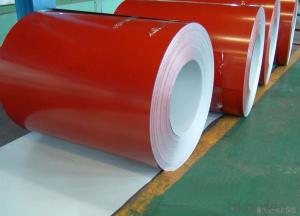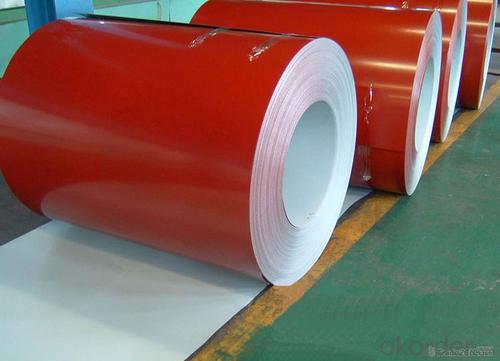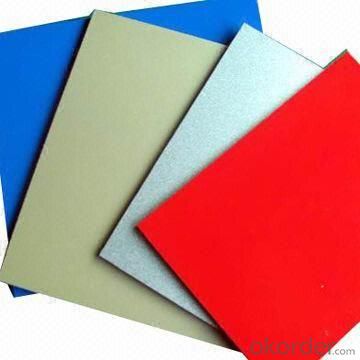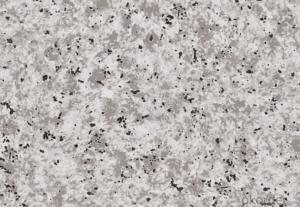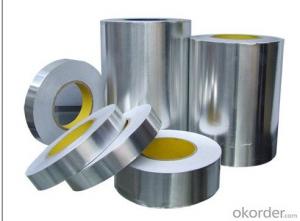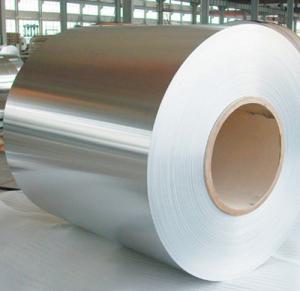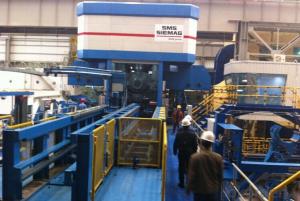Aluminum Foil Coil - Stone Power Coated Aluminum Coil
- Loading Port:
- Shanghai
- Payment Terms:
- TT OR LC
- Min Order Qty:
- 8 m.t.
- Supply Capability:
- 2000 m.t./month
OKorder Service Pledge
OKorder Financial Service
You Might Also Like
Specification
Structure of Aluminium Stone Power Coated in Coil Form:
Coated aluminum coil/sheet are of a wide range of colors, which gives wonderful appearance no matter in residential and commercial constructions of great exhibition centers.
The coated aluminum coil/sheet have been widely used in the fields of construction and decoration( garage doors, ceiling etc.), electronic appliances, lighting decoration, air-condition air pipes, sandwich panels and drainages etc.
Main Features of Aluminium Stone Power Coated in Coil Form:
1) High flexibility
2) Impact resistance
3) Excellent weather-proof durability
4) Anti-ultraviolet
5) High erosion resist
Images of the Aluminium Stone Power Coated in Coil Form:
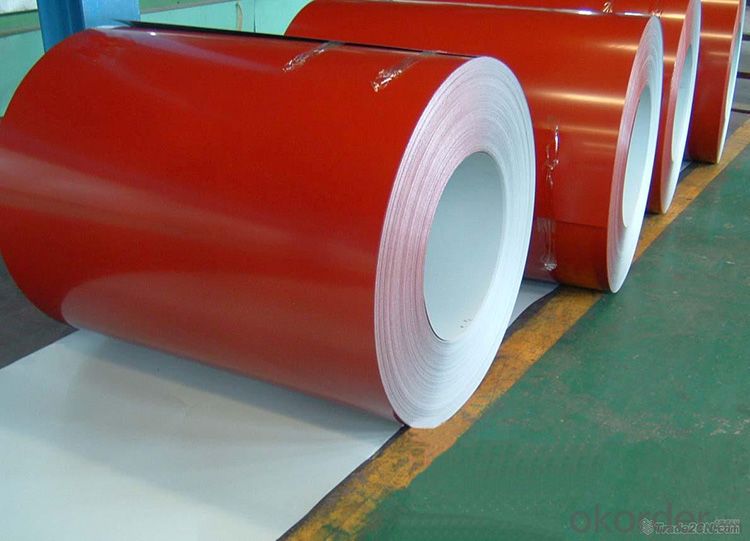
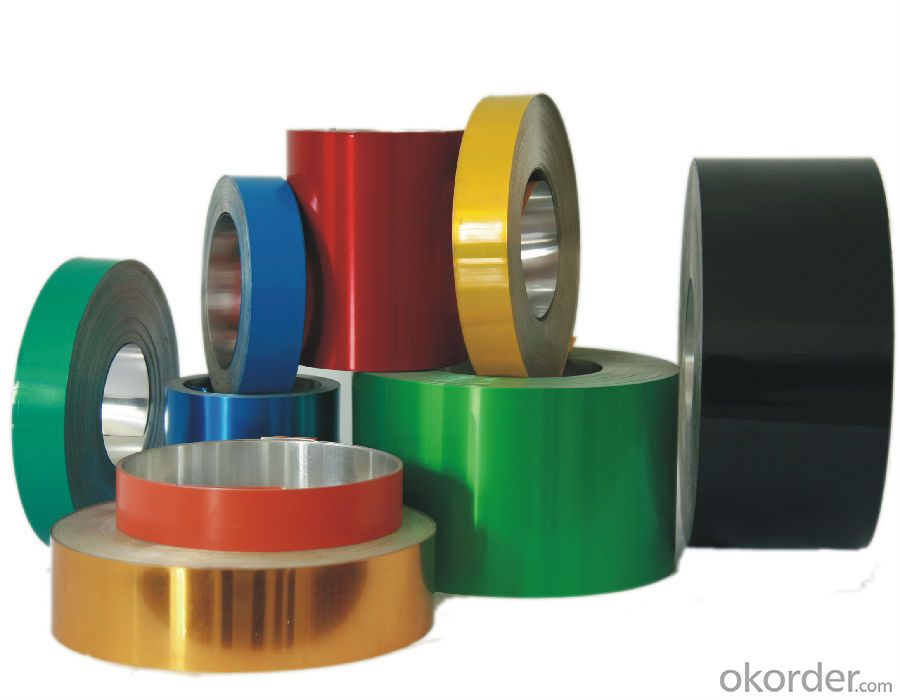
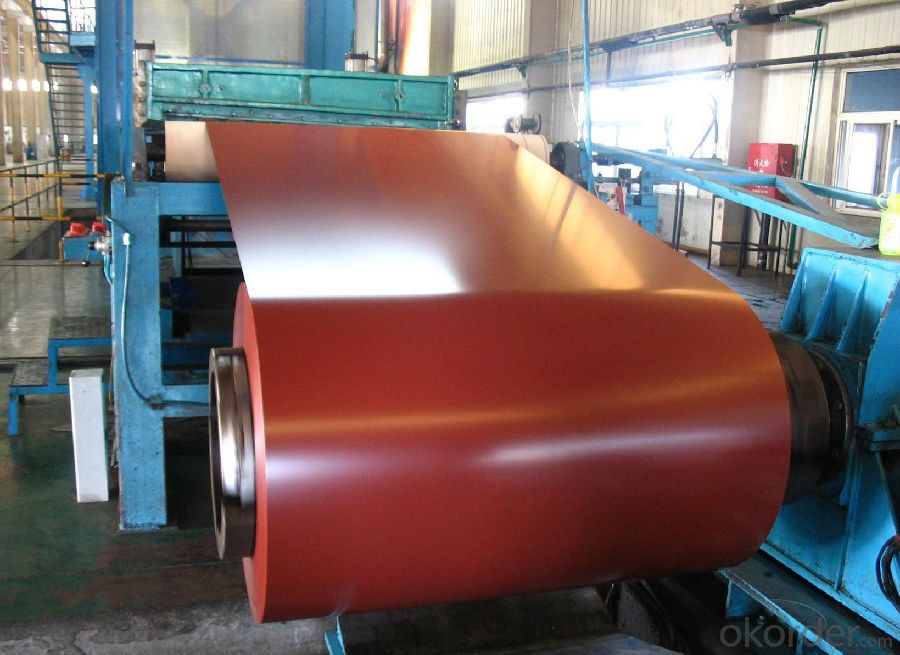
Aluminium Stone Power Coated in Coil Form Specification:
Alloy | A1100,A3003,A1050,A8011 etc |
Temper | H16,H18,H24 |
Thickness | From 0.024mm to 1.2mm |
Width | Standard width:1240mm |
Special width:1300mm,1520mm,1570mm,1595mm | |
Diameter | Standard dia:1200mm |
Interior dia:150mm,405mm,505mm | |
Weight | 2.5 T/coil,3.0 T/coil |
Coating | PE, PVDF, AC |
Surface | Embossed, mill finish, coated |
Color | AS to code RAL |
Gloss | 10-90%(EN ISO-2813:1994) |
Coating Thickness | PE: more than 18 micron |
PVDF: more than 25 micron | |
Coating Hardness (pencil resistance) | More than 2h |
Coating adhesion | 5J(EN ISO-2409:1994) |
Impact Resistance | No peeling or cracking(50 kg/cm,ASTMD-2794:1993) |
Flexibility (T-bend) | 2T |
MEK resistance | More than 100 |
FAQ Aluminium Stone Power Coated in Coil Form:
a.What is monthly capacity
---CNBM is one stated own company and our monthly capacity is about 2000tons.
b. Now which countries do you export your goods?
---Now we export to South East Asia,Africa, North America,South America ect.
- Q: How are aluminum coils used in the production of automotive radiators?
- Aluminum coils are commonly used in the production of automotive radiators due to their excellent heat transfer properties and lightweight nature. The coils are typically made from high-quality aluminum alloy, which offers superior thermal conductivity compared to other materials. In the manufacturing process, aluminum coils are first shaped into the desired configuration for the radiator's core. This can be done through various methods, such as extrusion or rolling. The coils are then carefully stacked and bonded together to create a sturdy and efficient heat exchanger. The main role of aluminum coils in automotive radiators is to transfer heat from the engine coolant to the surrounding air. As hot coolant flows through the tubes of the radiator, the aluminum coils efficiently absorb this heat. The large surface area of the coils, combined with their excellent thermal conductivity, allows for effective heat dissipation. Moreover, the lightweight nature of aluminum makes it an ideal material for automotive radiators. Reduced weight in vehicles leads to improved fuel efficiency and overall performance. Aluminum coils contribute to this by providing a radiator that is lighter than traditional copper or brass counterparts. Furthermore, aluminum coils offer other advantages in radiator production. They are corrosion-resistant, which helps prolong the lifespan of the radiator and ensures its durability. Aluminum coils also enable more flexible designs, allowing for the creation of radiators with complex shapes and configurations to fit various vehicle models. In conclusion, aluminum coils play a crucial role in the production of automotive radiators. Their excellent heat transfer properties, lightweight nature, corrosion resistance, and design flexibility make them an ideal choice for manufacturing efficient and reliable radiators for automobiles.
- Q: I don't have a rounded baking tray at the moment and would like to replace it with aluminium foil, do you think it's suitable and that it can withheld the intensity?
- Cheesecake batter is dense. An aluminium tray may not be stiff enough to retain the proposed shape of your cake. Test the pan; load it to the top with water. If it doesn't collapse your cheese cake will not either. You could try using two trays nestled together. You also may need to load the cake and tray on a flat tray when you move it around. Use a thermometer to know when the cake should be pulled. Cook's suggests the top limit at 150 degrees F. Do grease the sides of the pan. Be sure to loosen the cake from the pan side after it is out of the oven. I bake my cakes at 500 degrees F. for ten or twelve minutes, and then to the 150 degree F point at 200 degrees F. Do not open the oven or try to cool it down. Simply dial down the thermostat. If the cake looks too brown cover it with a piece of aluminium foil. Have fun! Avoid cracks...don't overcook the cake!
- Q: Can aluminum coils be used in electrical applications?
- Yes, aluminum coils can be used in electrical applications. Aluminum is often used as a conductor in electrical wiring due to its high conductivity and low cost compared to copper. Aluminum coils are commonly used in transformers, motors, generators, and other electrical equipment. However, it is important to note that aluminum has a lower electrical conductivity than copper, so larger aluminum coils may be required to achieve the same level of conductivity. Additionally, aluminum coils may require special insulation and connectors to prevent corrosion and ensure proper electrical connections.
- Q: Are there any limitations on the bending or shaping of aluminum coils?
- Yes, there are limitations on the bending or shaping of aluminum coils. Aluminum has a certain level of elasticity and ductility, which allows it to be bent or shaped to a certain extent. However, excessive bending or shaping can lead to cracking, deformation, or even breakage of the aluminum coils. Additionally, the thickness and temper of the aluminum coils can also affect their ability to be bent or shaped. Therefore, it is important to consider these limitations when working with aluminum coils to ensure their structural integrity is maintained.
- Q: Can aluminum coils be used in electrical cables?
- Yes, aluminum coils can be used in electrical cables. Aluminum is a commonly used material for electrical conductors due to its excellent electrical conductivity and relatively low cost compared to copper. It is especially used in power transmission and distribution cables where long-distance transmission is required. Aluminum coils are often used in overhead power lines and underground cables. However, it is important to note that aluminum has a lower tensile strength than copper, so the cables need to be properly designed and manufactured to ensure adequate mechanical strength. Additionally, aluminum conductors require larger cross-sectional areas compared to copper to achieve the same electrical performance, which can result in slightly larger cable sizes.
- Q: How do aluminum coils contribute to lightweight construction?
- Due to its properties as a metal, aluminum plays a crucial role in lightweight construction. Its low density sets it apart from other metals like steel or copper, making it significantly lighter. When formed into coils, aluminum increases its surface area, resulting in more efficient heat transfer and distribution. The utilization of aluminum coils in various industries such as automotive, aerospace, and construction leads to a notable reduction in overall weight. This reduction offers several advantages, including enhanced fuel efficiency in vehicles, increased payload capacity in aircraft, and easier handling and installation in construction projects. Furthermore, the lightweight nature of aluminum coils enables designers and engineers to develop more innovative and energy-efficient designs. With less weight to support, thinner and lighter materials can be used for other components, resulting in additional weight savings. This not only saves costs during manufacturing and transportation but also reduces environmental impact. Moreover, aluminum coils possess excellent corrosion resistance, making them ideal for outdoor applications. Their ability to resist rust and corrosion adds to their durability and longevity, ensuring that lightweight structures made with aluminum coils can withstand harsh environmental conditions. In conclusion, aluminum coils contribute significantly to lightweight construction by providing a durable and lightweight material. This enables designers and engineers to create more efficient and sustainable structures, vehicles, and products. The use of aluminum coils not only reduces the weight of the overall construction but also offers benefits such as improved fuel efficiency, increased payload capacity, and cost savings.
- Q: This question asks about the current market demand for aluminum coil, which is a versatile material used in various industries.
- <p>The market demand for aluminum coil is significant and growing due to its wide range of applications across industries such as construction, automotive, aerospace, packaging, and electronics. Its lightweight, corrosion resistance, and recyclability make it a preferred material for many applications. The demand is influenced by economic growth, technological advancements, and sustainability initiatives. As countries focus on greener construction and manufacturing processes, the demand for aluminum coil is expected to increase further.</p>
- Q: How are aluminum coils processed for surface preparation?
- Aluminum coils are processed for surface preparation through a series of steps. Firstly, they undergo degreasing to remove any dirt, oil, or grease from the surface. This is followed by etching, where the coils are treated with an acidic solution to remove any impurities and provide a clean surface for coating. Next, the coils are rinsed and dried to ensure a residue-free surface. Finally, a conversion coating process is applied to enhance corrosion resistance and promote adhesion of subsequent coatings.
- Q: How are aluminum coils processed for specific surface coatings?
- To achieve specific surface coatings on aluminum coils, a series of steps are undertaken. These steps encompass cleaning, pre-treatment, coating application, and curing. Initially, the aluminum coils are subjected to a thorough cleaning process to eliminate any dirt, grease, or contaminants that may impede the coating's adhesion. This typically involves utilizing chemical cleaning agents, rinsing, and sometimes mechanical techniques. Following the cleaning stage, the coils undergo a pre-treatment process, which readies the aluminum surface for optimal coating adhesion. Depending on the specific coating requirements, this pre-treatment may involve chemical etching, conversion coating, or a combination of both. Chemical etching creates a rough surface that enhances the bond between the aluminum and the coating, while conversion coating forms a thin layer that enhances corrosion resistance and adhesion. Upon completion of the pre-treatment, the desired surface coating is applied to the aluminum coils. This can be accomplished using various methods such as coil coating, spray coating, or electrostatic coating. Coil coating is a prevalent technique in which the coil is continuously fed through a coating line, ensuring the even and precise application of the coating material onto the surface. Following the coating application, the aluminum coils undergo a curing process to ensure proper adhesion and hardening of the coating. Curing can be achieved through heat, whereby the coated coils are passed through an oven or furnace at a specific temperature and duration to facilitate cross-linking and curing of the coating material. Alternatively, certain coatings may necessitate UV curing, wherein the coated coils are exposed to ultraviolet light to achieve the desired curing process. In summary, the process of processing aluminum coils for specific surface coatings involves cleaning, pre-treatment, coating application, and curing. This comprehensive approach guarantees that the coils are adequately prepared and coated to meet the desired surface properties and performance requirements.
- Q: Normal aluminum like you find in the ground, not the man made stuff
- Not at visible wavelengths at room temperature.
Send your message to us
Aluminum Foil Coil - Stone Power Coated Aluminum Coil
- Loading Port:
- Shanghai
- Payment Terms:
- TT OR LC
- Min Order Qty:
- 8 m.t.
- Supply Capability:
- 2000 m.t./month
OKorder Service Pledge
OKorder Financial Service
Similar products
Hot products
Hot Searches
Related keywords
